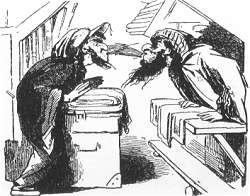 [Emirates 24/7] As the late Osama bin Laden [Emirates 24/7] As the late Osama bin Laden
... he's rotten though not quite forgotten...
watched his organization get picked apart, he lamented in his final writings that Al Qaeda was suffering from a marketing problem.
His group was killing too many Mohammedans and that was bad. The West was winning the public relations fight. All his old comrades were dead and he barely knew their replacements.
Faced with these challenges, Bin Laden, who hated the United States and decried capitalism, considered a most American of business strategies. Like Blackwater, ValuJet and Philip Morris, perhaps what Al Qaeda really needed was a fresh start under a new name.
The problem with the name Al Qaeda, bin Laden wrote in a letter recovered from his compound in Pakistain, was that it lacked a religious element, something to convince Mohammedans worldwide that they are in a holy war with America.
Maybe something like Taifat Al Tawhed Wal-Jihad, meaning Monotheism and Jihad Group, he wrote. Or Jama'at I'Adat Al Khilafat Al Rashida, meaning Restoration of the Caliphate Group.
As bin Laden saw it, the problem was that the group's full name, Al Qaeda Al Jihad, for The Base of Holy War, had become short-handed as simply Al Qaeda. Lopping off the word "jihad," bin Laden wrote, allowed the West to "claim deceptively that they are not at war with Islam." Maybe it was time for Al Qaeda to bring back its original name.
The letter, which was undated, was discovered among bin Laden's recent writings. Navy SEALs stormed his compound and killed him before any name change could be made.
The letter was described by senior administration, national security and other US officials only on condition of anonymity because the materials are sensitive.
The documents portray bin Laden as a terrorist chief executive, struggling to sell holy war for a company in crisis.
At the White House, the documents were taken as positive reinforcement for President Barack B.O. Obama's effort to eliminate religiously charged words from the government's language of terrorism. Words like "jihad," which also has a peaceful religious meaning, are out.
"The information that we recovered from bin Laden's compound shows Al Qaeda under enormous strain," Obama said on Wednesday in his speech to the nation on withdrawing troops from Afghanistan. "Bin Laden expressed concern that Al Qaeda had been unable to effectively replace senior forces of Evil that had been killed and that Al Qaeda has failed in its effort to portray America as a nation at war with Islam, thereby draining more widespread support."
Bin Laden wrote his musings about renaming Al Qaeda as a letter but, as with many of his writings, the recipient was not identified. Intelligence officials have determined that bin Laden only communicated with his most senior commanders, including his deputy, Ayman Al Zawahri, and his No. 3, Mustafa Abu Al Yazid, according to one US official. Because of the courier system bin Laden used, it's unclear to US intelligence whether the letter ever was sent.
Al Yazid was killed in a US Arclight airstrike last year. Zawahri has replaced bin Laden as head of Al Qaeda.
In one letter sent to Zawahri within the past year or so, bin Laden said Al Qaeda's image was suffering because of attacks that have killed Mohammedans, particularly in Iraq, officials said. In other journal entries and letters, they said, bin Laden wrote that he was frustrated that many of his trusted longtime comrades, whom he'd fought alongside in Afghanistan, had been killed or captured.
Using his courier system, bin Laden could still exercise some operational control over Al Qaeda. But increasingly the men he was directing were younger and inexperienced. Frequently, the generals who had vouched for these young fighters were dead or in prison. And bin Laden, unable to leave his walled compound and with no phone or Internet access, was annoyed that he did not know so many people in his own organization.
The US has essentially completed the review of documents taken from bin Laden's compound, officials said, though intelligence analysts will continue to mine the data for a long time. |


 Taliban in the Bajaur tribal district split into two factions after infighting between two militant organisations in Mohmand Agency led to the killing of eight members of one group on July 18.
Taliban in the Bajaur tribal district split into two factions after infighting between two militant organisations in Mohmand Agency led to the killing of eight members of one group on July 18.